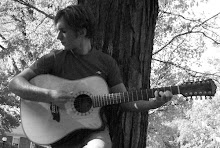First of all, the church (which so many Christians passionately define as a worldwide body of people in their rhetoric yet still refer to as a specific congregation or building in their day-to-day speech) met in a nondescript community building somewhere in the vicinity of downtown Jackson. We had arrived early for a 10:00 service, but the service really started at 10:15, which in Spanish is roughly translated as "10:20 or so." Two Spring Arbor students holding battered guitar cases and a young hispanic guy had already arrived, and we had to wait with them for someone to show up with the keys to the building. Once I stepped inside, I felt like there must have been some mistake and I was wandering through some outdated inner-city school instead. The primary room was bland and square and filled with the kind of chairs I remember sitting in during the 5th grade. It took me a moment to realize that I did not have to keep searching for the sanctuary: this was it. Lulu and I had just been talking about this kind of thing the day before, but I'm rather embarrassed to have been so surprised to see it actually done. While the issue at so many churches is "is a 50/50 split between God's work and building upkeep good enough?" or "do we really need to spend $50,000 to renovate the church building," the issue here was more of "do we really need a church building at all?" And come to think of it, that really didn't even seem to be an issue.
As it turned out, one of the members of the small congregation had just lost her younger brother to a heart attack, so at one point in the service she came forward so that the rest of the congregation could gather around and offer prayers. But first she asked to say a few words about her brother. She looked to be about seventy, and as she stepped forward I immediately noticed that she radiated a complete confidence that was softened with a perfect grandmotherly gentleness. In English colored with a light accent she explained that her and her younger brother were great "pals" as they grew up together. Briefly she recounted how he turned from God but she kept loving him just as much, until he again followed the Lord and did many good works throughout his life. So much joy, faith and thankfulness beamed from her that I felt like I could absorb it like sunlight and walk around for at least a couple of days with a summery spiritual complexion. When she was done talking we gathered around and several people prayed for her. I'm sure she wasn't the person in the room most in need of prayer.
Of all days, that Sunday happened to be the 18th anniversary of a peace pact signed in el Salvador to end 12 years of civil war. And of all things, one of the members of the congregation used to be an el Salvadorian soldier. As the final portion of the service, he shared his testimony.
"When you say thousands were killed," he began in Spanish, looking at the Spring Arbor guitarist who had introduced him and summarized the conflict, "it really was thousands.
It is very different to be able to say this in some theoretical sense than to have actually lived through it." I looked at the guitarist and noticed that he nodded with respect to that truth. The statement, I felt, was not directed towards him and he rightfully did not appear to take it personally. The ex-soldier continued, saying explaining that he felt he could identify with Paul's conversion from violence in the new testament. His accent was very strong and I had a much harder time understanding his Spanish than the Spanish of the native-English speaking translator. The word "guerra" (war) and a few others stuck out frequently, and I waited for the translator to piece them all together.
My busy thought process was interrupted when the man became silent. Finally I stopped considering reactions, Spanish phrases, and his biblical understanding, and caught on to the only thing worth considering. This story was worth being told because it was so powerful that silence explained it better than words. He had stopped talking because he was about to cry. Only then did I realize that this was not a man with a Sunday-school lesson or an interesting perspective. This was a hardened soldier who was so moved by a conversion that happened as long ago as I've been alive that he couldn't speak of it without being brought to tears.
He spoke a short sentence, and the translator had to lean in to make out the words.
"I gave up my M-16." He said, "And took up the bible."
"All thanks to God." He left the stage, and the service was over.

hmmmm... I fall into that too- evaluating everything and forgetting to just absorb the truth in someone's story. I'm glad we're going back.
ReplyDelete